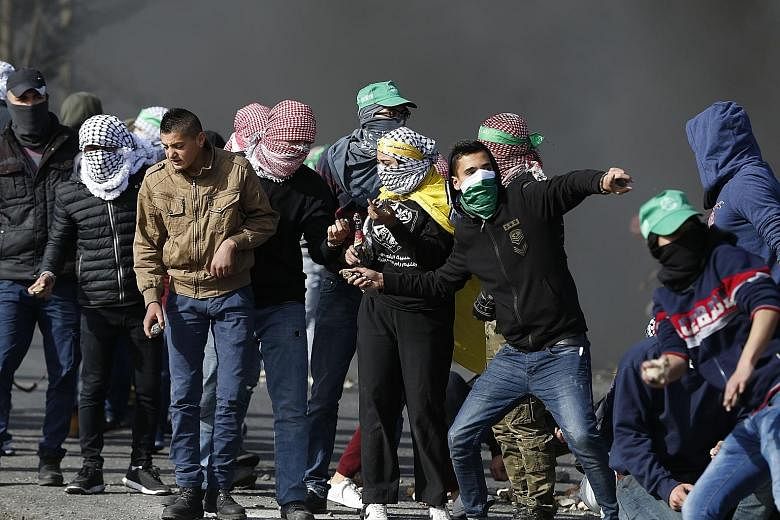In one sense, the resolution of the Arab League special summit last Saturday brought something new: Since the oil embargo in the early 1970s, the Arab world has not used such harsh language against the United States.
A two-page-long communique decried US President Donald Trump's decision to recognise Jerusalem as the capital of Israel and move the US Embassy there.
His decree was a "dangerous violation of international law" that had no legal impact and was "void", it said. "It deepens tension, ignites anger and threatens to plunge the region into more violence and chaos," the league stated.
Lebanese Foreign Minister Gebran Bassil called for "pre-emptive measures, beginning with diplomatic measures, then political, then economic and financial sanctions" against America. In the end, the gathering of foreign ministers agreed on no concrete actions, except to refer the matter to the United Nations Security Council.
No less surprising than Mr Trump's speech has been the rather muted response of the Palestinian street. Violence has remained at relatively low levels, mostly involving youths throwing stones or incendiary devices that hurt no one.
Four Palestinians died: Two were shot during protests on the Gaza border, two were Hamas fighters killed when Israel responded to repeated missile attacks.
On Sunday, in the only terror attack so far, a Palestinian man stabbed a security guard in Jerusalem's central bus station. The guard was severely injured and the attacker was arrested. This was far less than anticipated after the radical Islamist Hamas in Gaza called for a third intifada, or popular uprising, and after other organisations proclaimed several "days of rage".
Even popular protests remained at low levels. According to some estimates, no more than 12,000 people demonstrated in several hot spots over the last few days - a trifle compared to other protest waves. While Palestine is most affected by Mr Trump's decision, it also remained one of the region's calmest spots.
"People are sick of fighting," said Mr Elias Zananiri, a senior Palestinian analyst. After years of chaos racked the Middle East, and after a violent summer involving terror attacks, protests and Israeli reprisals, many did not have the zest for another escalation. Besides, the Palestinian Authority is keeping a tight lid on protests, he contends.
Palestinian analyst Sam Bahour takes a different view. "People have not even begun to comprehend all of the ramifications of this historic decision," he said. People were waiting for "the leadership to come forward with a clear new strategy".
Mr Hassan Faraj, a political activist and member of the central committee of the ruling Fatah party, offered logistical reasons for the dearth of protests: "The Israelis control all the streets in the West Bank, all the accesses to our cities. It is impossible to gather large masses."
Dr Moustafa Barghouti, a prominent opposition politician and vociferous critic of the establishment, thinks the estimates of protesters are wrong. "Tens of thousands have already protested in Palestine," he said. According to him, the "third intifada has already started. This is only the beginning, and I have no doubt that these protests will grow over the coming days and weeks".
Mr Faraj also disagrees with the notion that the public's reaction is subdued. "There have been many protests at many different hot spots, just that we held them inside our cities instead of clashing with Israeli soldiers." He thinks it would be best to keep it that way: "We want to keep our protests peaceful, because Israel would benefit diplomatically from every attack we commit."
Not everyone thinks this way. On Sunday, the Israeli army destroyed a second attack tunnel dug by Hamas from Gaza hundreds of metres into Israeli territory - erected in preparation for a surprise attack.
Considering the dramatic turn US policy has now taken, one might expect to find despondency in Ramallah. None of that was evident. "This strong international reaction has raised a lot of hopes that now the world may actually do something for us," said Mr Zananiri.
"I am overwhelmed by the stance the world has taken", added Dr Barghouti, citing global protests. "Many thought the Arab Spring relegated Palestine to the backburner... Those protests have proven Palestine remains a pivotal issue."
That puts huge pressure on Arab governments to do more, he believes, saying that while he "expected more from the Arab League, we will see to it that eventually, their deeds will match their words, mainly in the form of new boycott measures".
Palestine's political leadership has begun consultations to chart a different course. "It is evident we need a new approach," said a negotiator. It was clear the US had "disqualified itself as a mediator. That opens up a whole list of new options".
Up until now, Washington had threatened sanctions should the Palestinians turn to unilateral steps. That threat has become irrelevant. One option could be to ask nations to respond to Mr Trump's unilateralism by "recognising Palestine as an independent, occupied state within the 1967 borders".
Dr Barghouti suggests another course of action: "Since negotiations seem out of the question now, the path is clear to indict Israel at the international court in Hague."
Mr Trump's decision, far from discouraging Palestinians, seems to have revived their determination to confront Israel on the international front.


